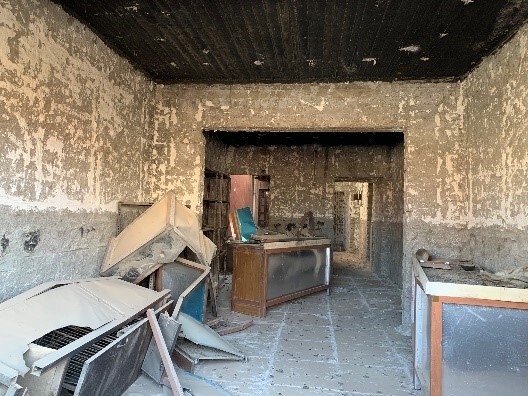ISIL control over the Nineveh province, early 2014, caused huge displacement for the local population who had to seek shelter in other governorates in Iraq, especially in Kurdistan Region of Iraq (KRI). People returning to the district of Al Hamdaniyeh remain vulnerable since there is extensive damage of infrastructure and houses in the area. They also lack the basic services they need for their daily life. Moreover, the circumstances they had been through often forced them to rearrange their priorities to put shelter and food over education and healthcare.
Yazi is a widowed-working-mother, 57 years old, responsible for two daughters and two sons. She had lost her house and everything inside it because of ISIL military operations. When the war started in Al Hamdaniyeh, she ran away with her children; but her husband was the only one in the whole district who refused to leave. He stayed home to protect it and he never thought that he would be part of the family’s grief. ISIL soldiers killed him and burnt the house.
‘We felt desperate and emotionally destroyed,’ Yazi says. The family was going through hard times. They could not go back to a burnt home with nothing inside it. None of their relatives could offer to help them rehabilitate it and they were not able to do it themselves either. ‘We felt emotionally terrible because of overthinking, worrying and tiredness,’ she says.
The family went back to Al Hamdaniyah after the war was over because they were tired of displacement and being away from their home and their community. Thanks to a project entitled “Improve Living Conditions and Enhance Resilience of Most Vulnerable Returnee Families through Shelter Rehabilitation in Al Hamdaniya district, Nineveh governorate” implemented by Caritas Czech Republic, the family was able to receive support for the necessary repairs.
‘We felt so hopeful when we learnt that our home will be rehabilitated!’ said Yazi. The whole house was rebuilt and rehabilitated to suit the family. After the rehabilitation process was done, small changes were made in the house to make the family feel more comfortable in it. What made Yazi happier during the rehabilitation process was that she had a significant role in it, she could decide and choose what she wanted to have done. As a result, the family could finally settle down in their own place, where they have good memories and feel cozy. They went back to their community, and their social life is growing and blooming again. Yazi could also rearrange the family’s priorities again and offer her children support that she was not able to provide before the reconstruction.
‘We felt so hopeful when we learnt that our home will be rehabilitated!’
This project was implemented by Caritas Czech Republic in partnership with the Church Supreme Board for Reconstruction – Baghdeda and with support from the Czech Bishops’ Conference. The project resulted in the rehabilitation of 32 houses, which altogether improved the living conditions of 230 returnees. It was completed by either providing the families with financial aid to reconstruct the houses by themselves or by hiring local craftsmen to help in the rehabilitation.






